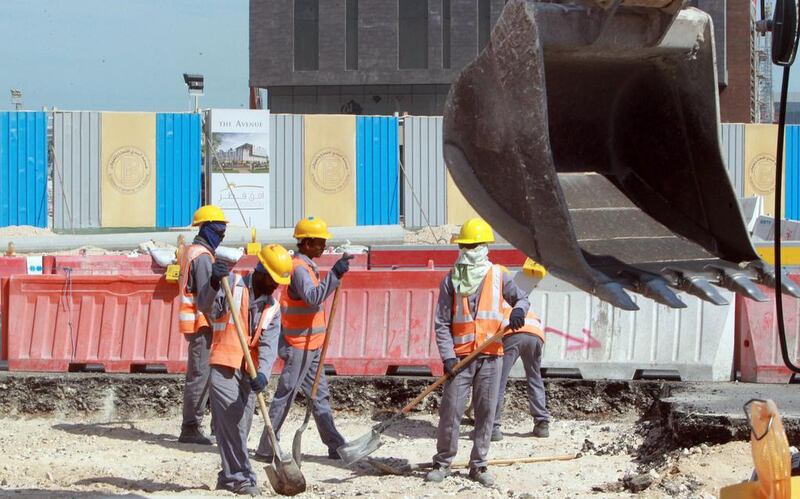MUSCAT // Qatar pledged to replace its controversial kafala sponsorship law on Sunday, as the country faces intense scrutiny ahead of hosting the 2022 football World Cup.
The kafala law gives employers the ability to stop migrant workers from obtaining an exit permit to leave the country and also from changing jobs.
Qatar’s labour and social affairs ministry said the law would be replaced early next year by legislation “currently under review”, but did not provide further details.
The country's 1.6 million-strong foreign work force is composed largely of migrant workers from Asia. Hundreds have reportedly died in the tough working environment.
In June, the International Trade Union Confederation warned that 4,000 foreign workers could die in construction site accidents in Qatar by the time the 2022 tournament kicks off.
The Qatari labour ministry said on Sunday that the foreign workers “earn more and live in better conditions than in their home countries”.
“We believe that the people helping us build our country deserve to be fairly paid, humanely treated and protected against exploitation. That is why we are reforming our labour laws and practices,” it added.
Qatari officials had announced in May that the kafala law would be changed to a system based on employment contracts.
“We are going to abolish the kafala system and it will move to the legislative institutions,” said human rights director of the Qatari interior ministry, Colonel Abdullah Saqr Al Mohannadi, according to the London-based Guardian newspaper.
“It will be replaced by a contractual relationship between employer and employee. We hope that the exit visa will be abolished completely.”
Disputes over an employee leaving the country were supposed to be resolved within three days. The workers would be allowed to freely change jobs at the end of their contracts. Currently, they require a certificate of no objection from their employer to switch jobs. Foreign workers with open-ended contracts would be able to change jobs after five years.
The new law is also expected to include harsher penalties for employers who confiscate their employees’ passports.
While the details expected in the new legislation were previously reported, Sunday’s announcement was the clearest indication yet of when Qatar will move to replace the kafala law, which gives employers such a high degree of control over the employees they sponsor that it has been likened to modern-day slavery by human rights groups.
Amnesty International on Wednesday urged Qatar to hasten its reforms to protect migrant workers from abuse. The UK-based human rights group said in a new report that failing to do so "will call into question whether the Qatari authorities are serious about reform".
“We intend to effect meaningful and lasting change for the benefit of all those who live and work in Qatar,” a labour ministry statement said.
Fifa, the football world body, on Thursday cleared Qatar of the corruption allegations surrounding it being chosen to host the 2022 World Cup. Qatari officials were accused of bribing football officials to secure rights to host the competition. Fifa has decided against a revote on hosting the competition, despite the simmering controversy.
Qatar said it never doubted the “clean” record by which it won the bid to host the tournament.
jvela@thenational.ae
* with reporting by Agency France-Presse and Associated Press





